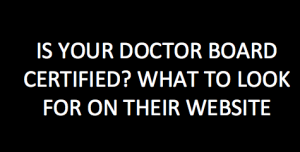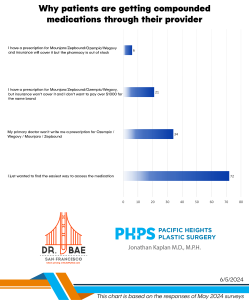 When it comes to finding the right doctor for your cosmetic procedure, what training they’ve had and what board certifications they have can be very confusing. In this post and video below, we’ll give you the tools needed to make you better equipped to check doctor’s credentials in the future.
When it comes to finding the right doctor for your cosmetic procedure, what training they’ve had and what board certifications they have can be very confusing. In this post and video below, we’ll give you the tools needed to make you better equipped to check doctor’s credentials in the future.
Some examples will show a doctor that trained in a specialty, became board certified in that specialty and practices in that specialty. Seems pretty straightforward, but as you’ll see in other examples in the video below, some doctors don’t even finish a residency. Here’s a little known secret – as long as a doctor finishes the first year of any residency, they can obtain a medical license. As long as they have a medical license, they can pretty much do anything they want in their office, like hair restoration or Botox or hormone replacement therapies.
They can’t do heart surgery because you’d have to be in a hospital to do that and a hospital requires you be board certified in heart surgery to perform heart surgery. So when it comes to cosmetic procedures that can typically be done in the office, you really need to figure out if the doctor is trained in the services they’re providing and if they’re board certified in that field. While it’s not illegal to practice outside of your specialty (surprising I know), it is a bit questionable to practice a form of medicine that you didn’t have formal training in. Just because a doctor has a license doesn’t mean they finished a residency. The extent of their training may only be a weekend course.
Often “cosmetic surgeon’s” will highlight the year of surgery internship they did. An internship means they did one year of residency…just enough to get a medical license. But they didn’t finish a surgery residency and for that reason, they’re not board certified in surgery. A typical surgery residency is at least five years long so doing an internship leaves you four years short! However, doctors that want to be know as a cosmetic surgeon will go out of their way to mention that one year of general surgery, to give more credibility to the idea of calling themselves a cosmetic surgeon.
To make things even harder for the consumer, there are new board certifications that aren’t recognized in the medical community. If you’re not sure if a doctor’s board certification is legit or not, check out the American Board of Medical Specialties website. Any board that oversees doctors that go through a legitimate residency training program and become board certified, will be included in this site. Boards like dermatology, otolaryngology (which is ENT) and plastic surgery are included. Notice there’s no recognized board of cosmetic surgery since that’s a subset under dermatology, plastic surgery, facial plastic surgery and ophthalmology.
It’s confusing out there and I’m afraid some doctors welcome the confusion because then you might not recognize their lack of training. So remember, 1) did they complete a residency, 2) are they board certified by a board recognized by the American Board of Medical Specialties and 3) are they board certified in the field they’re practicing (ie what they’re treating you for!)
If there’s a doctor’s website you’re not sure about, leave the website in the comments section below and we can review it for you. We won’t say if they’re a good or a bad doctor, competent or incompetent but we can tell you if they’re legit based on the tools we discussed previously.
It does make you wonder – why does it have to be so hard to determine the truth? If they’re legit, it’s easy to figure out. So ask yourself – why would a doctor make their website misleading? If they didn’t go through the training and become board certified by a recognized board, why is that? Are they taking a shortcut in training? Will they take a shortcut in your treatment? In the end, you have to look out for yourself. Be safe out there!
How to check a doctor’s credentials online!
Click here for the original blog post written by Dr. Jonathan Kaplan for BuildMyBod.




